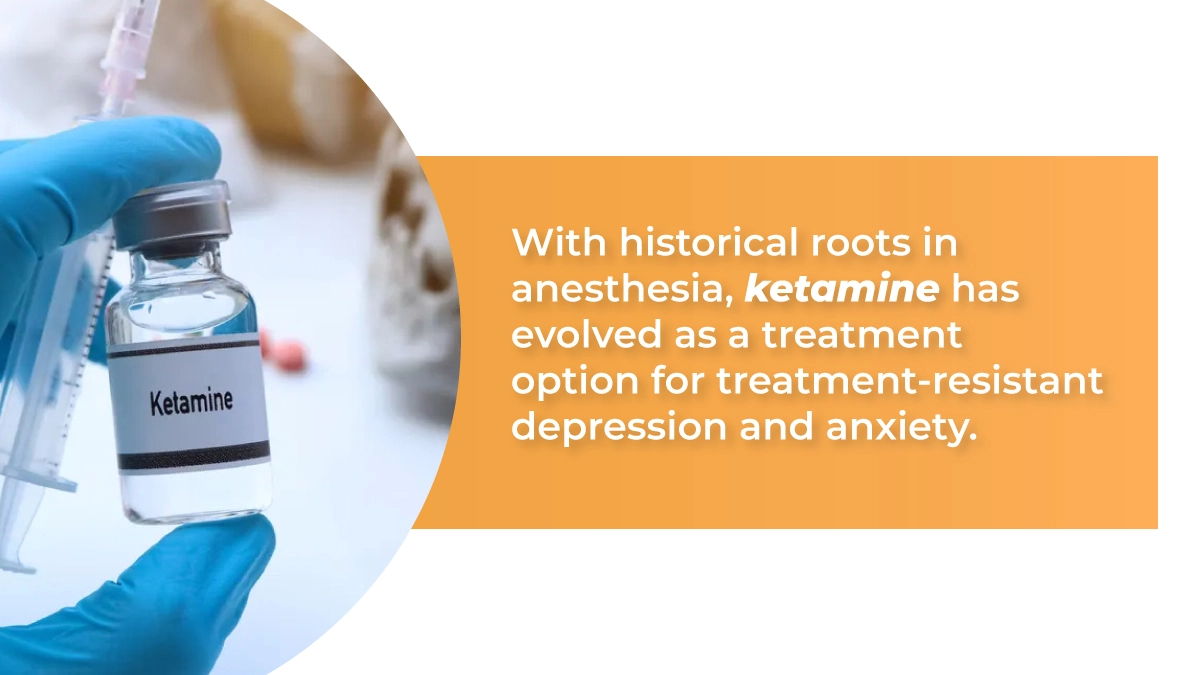
Does Insurance Cover Suboxone Treatment Costs
Explore the basics of insurance coverage for suboxone treatment in this guide from The Recovery Team-Newton.

Ketamine therapy helps people with mental health conditions that are resistant to other treatments. Unlike traditional antidepressants, ketamine works quickly, often providing relief within hours.
It’s administered in a controlled setting through an injection or nasal spray. Many find it helpful for conditions like depression, anxiety, and PTSD. Though research is ongoing, ketamine therapy shows promise in offering rapid and effective relief. That makes it a unique and evolving option for mental health treatment.
Ketamine therapy offers swift relief, impacting mood and providing hope for various mental health conditions. Here’s what you need to know:
The Recovery Team-Newton can help you find hope and overcome mental illness. Call us today at (508) 978-2772.
Ketamine, discovered in 1962, initially found fame as an anesthetic in surgeries. Its historical use traces back to the Vietnam War, when it was used on the battlefield. Soldiers called it the “buddy drug” due to its pain-relieving properties.
Over time, its role expanded beyond anesthesia. From surgeries to therapeutics, ketamine has evolved. Beyond its initial anesthetic purpose, it is now used in treating mental health disorders.
In the medical world, ketamine treatment has shown positive results in treating depression, as proven in a report by the National Institutes of Health through its rapid-acting antidepressant effects.
In clinical settings, a low dose of ketamine is administered, impacting blood pressure and providing relief for mood disorders. However, like any treatment, there are potential risks, such as addiction. That is why ongoing research has proven essential in exploring its potential in addressing various conditions such as post-traumatic stress disorder (PTSD) and anxiety, emphasizing the need for cautious medical supervision.
Ketamine therapy’s effectiveness lies in its unique actions on the brain. Administered in a supervised environment, a low dose of ketamine rapidly influences neurotransmitters like glutamate. This impact triggers a cascade of reactions, fostering the growth of new connections between brain cells.
Ketamine works on the N-methyl-D-aspartate (NMDA) receptors, influencing mood regulation. This process is crucial in addressing conditions like major depressive disorder and treatment-resistant depression. Moreover, ketamine’s swift action sets it apart. Unlike traditional antidepressants, which may take weeks to show results, ketamine often brings relief within hours.
Ketamine therapy is an effective treatment for mental illness with benefits like rapid relief, often within hours. It’s effective for various conditions, providing significant improvement. The treatment’s positive impact on mood and quick action make it a promising option, bringing newfound possibilities to those seeking relief. The benefits of undergoing this type of treatment include:
In the quest for a breakthrough in mental health care, ketamine therapy emerges as a valuable and efficient option. Moreover, the treatment’s neuroprotective and anti-inflammatory properties contribute to its holistic impact on emotional health. It provides hope and real progress for individuals navigating challenging conditions.
Embarking on ketamine therapy involves a carefully crafted process aimed at addressing various mental health conditions. Here’s what you can expect from your first session:
The therapy typically begins with an intravenous infusion of ketamine. As a controlled substance, this process occurs in a clinical or partial hospitalization program setting. The choice between different forms of ketamine, such as intravenous infusion or intranasal esketamine, depends on the patient’s condition.
Ketamine’s rapid action on the AMPA receptor contributes to its antidepressant effect. This mechanism often leads to a quick and significant improvement in mood, setting ketamine therapy apart from traditional treatments. The intravenous infusion is a vital first step, positioning ketamine as a valuable option in treating conditions like obsessive-compulsive disorder.
After the infusion, patients might notice a significant improvement in their mood and mental well-being. This rapid action is a distinguishing feature of ketamine therapy, making it a promising first step for those seeking swift relief from treatment-resistant depression or anxiety. For continued progress, post-therapy sessions may involve discussions about the experience and any shifts in thoughts or feelings.
Ketamine therapy, while generally safe to treat depressive symptoms, may have some side effects that are essential to know. Understanding these effects helps individuals make informed decisions about their mental health treatments.
In the short term, after a single dose, some people may experience what’s known as the acute effects of ketamine. That can include sensations like dissociation, dizziness, and changes in perception. It’s important to note that these effects are temporary and typically wear off as the treatment progresses.
The long-term effects of high levels of ketamine use as an illicit psychedelic party drug are a concern, especially when young people misuse the drug. Prolonged use may potentially impact various aspects of health, including high blood pressure, and may lead to suicidal thoughts. Chronic use may result in inflammation and damage to the urinary bladder.
Doctors typically recommend ketamine therapy for major depression, chronic pain, or depression symptoms not responding to other treatments. However, substance use disorders may limit eligibility.
Doctors may suggest treatment services involving ketamine-assisted psychotherapy for a long-term recovery. Before starting, consult with doctors specializing in such therapies to ensure they align with your needs and conditions. Adhering to clinical guidelines ensures the safe and effective use of ketamine therapy in addressing various mental health challenges.
Ketamine therapy is one of the many treatments to help people with mental illnesses. The Recovery Team-Newton has a team of medical experts to help you get the holistic treatment that is right for you. We offer an outpatient program for less chronic conditions with structured services, including individual and group therapy. This program follows a flexible schedule.
Learn more about our services today by calling us at (508) 978-2772.
Yes, like any medical treatment, ketamine therapy may have potential side effects. These can include short-term effects like dizziness or changes in perception after a single dose.
Long-term use, especially at high levels, might be associated with health concerns such as high blood pressure. It’s important to discuss any concerns or experiences with healthcare professionals during the therapy to ensure a safe and effective treatment process.
Ketamine infusion therapy helps to treat anxiety disorders by acting quickly on the brain’s receptors, making a positive impact on mood. Administered under medical care, it may provide rapid relief from anxiety symptoms. This drug acts quicker than other traditional medications and alleviates the symptoms.
Ketamine is a dissociative anesthetic that has been used for decades in medical settings. Ketamine therapy recently gained popularity as a helpful drug for depression and anxiety by blocking certain brain receptors, leading to rapid relief. This therapy is often managed in a controlled setting under the supervision of healthcare professionals.

Explore the basics of insurance coverage for suboxone treatment in this guide from The Recovery Team-Newton.

Explore the effectiveness of medication-assisted treatment with The Recovery Team-Newton.

Explore the examples of dual diagnosis and its treatment plans for better outcomes with The Recovery Team-Newton.